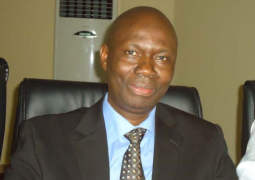
The
governor of the North Bank Region, Ebrima K.S. Dampha, has underscored the
European Union’s contribution to the government and civil societies to boost
food and nutrition security for women and children to enhance health of
families.
The Governor was speaking on Tuesday at a
regional launching of a 4-year Bio-Fortifications Project to be implemented by
Njawara Agricultural Training Centre in partnership with United Purpose, an
International NGO.
The
event was held at the conference hall of the Kerewan Area Council in the North
Bank Region.
He
said the project supports farming communities to access quality, improved
highly nutritional crops and reduced vulnerability of women and children under
5 from malnutrition.
He
commented that the project would promote value chain approach to ensure
sustainability and nutritional uptake at household levels.
“The
objective of the project is to reduce under nutrition and poverty of vulnerable
population (women and children) by strengthening sustainable access to and
consumption of bio-fortified and resilient high nutrition food,” he stated.
Bio-Fortifications
Project targets 18, 000 participating farmers including regional women
marketing federation to boost value chain improvement on production,
processing, consumption and marketing.
Governor Dampha announced that the project would build the capacity of 60 mothers at school level for better nutrition and practical cooking demonstration.
Ousman
Jammeh, Project Manager of Bio-Fortifications Project at the United Purpose
formerly Concern Universal, said the project is aimed at systemic and sustainable changes that would
provide better health and nutrition based on a value-chain approach to ensure
maximum sustainability.
The
strategy would be to adopt a bottom-up approach of introduction of new
varieties of bio-fortified crops for orange fleshed, sweet potato high Fe and
Zn Pearl Millet (PM); and enhanced production and consumption of African leafy
vegetables (ALVs).
The
cooking demonstrations and processing mechanisms aim to preserve a maximum
amount of nutritional value of the crops and encourage their wide consumption
among the target groups.
This
would be complemented by advocacy efforts with government institutions to
engage in formulating policy for bio and conventionally fortified foods in the
region.
This
effort would strengthen 300 women groups
to establish ‘mothers clubs, links to local health workers; identify and
monitor underweight children in communities and link mothers to groups; build
capacity to train on nutritional health; awareness/education program; support
women’s entrepreneurship, leadership, link to enhance agricultural production
of foods required for a balanced diet throughout the year; holding of cooking
demonstrations at various clinics to learn how to cook nutritious meals.
The
action would facilitate review of current strategy and laws on fortification to
be widened and become inclusive to wider fortification possibilities and
include all crops targeted through stakeholder meetings; technical inputs for
private sector processors; consultation and planning meetings; study visit to
Senegal and launch of a roadmap.
Mama
Manneh, Executive Director of Njawara Agricultural Training Centre (NATC),
noted that the project would strengthen farming communities.
He said the project would harness farmers’
capacity with improved variety of seed and vegetable to enhance and accelerate
food production and nutritional security.
He
declared that the project would partner with NaNA, NARI, the Ministry of
Agriculture, Ministry of Health, Food Safety and Quality Authority, Department
of Agriculture, Food Technology Services, as well as UN agencies such as WHO
and FAO, with support from sector specialists that would identify and analyse
current policies, which would provide a baseline for improvement.
Buba
Jatta of NaNa and Nutrition Field Officer at Regional Health Team Directorate
of Farafenni, thanked NATC and United Purpose for partnering with NaNa.
He
noted that it would strengthen more public awareness on the significance of
nutrition security and exclusive breastfeeding to enhance growth and eradicate
stunted development of children.
He
assured of his office’s commitment to working with stakeholders in promoting
the health of women and children.
Mariama
Sonko, President of SOCILITA women marketing federation, commented that the
project would enhance food production and accelerate marketing of farm produce.
She said the federation would obviously partner with the project to promote value chain addition.



